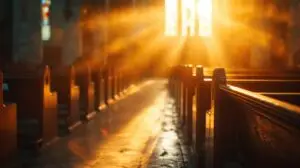On one occasion when a friend gave Andrew Fuller a tour of Oxford and pointed out to him some of the exquisite architecture and ingenious craftsmanship of the buildings, Fuller responded, “Brother, I think there is one question, which after all that has been written on it, has not yet been well answered.” When his friend inquired what that subject was, Fuller responded, “What is justification?” They retired to a fireside where they could discuss the subject.1
And so it was with Fuller. His mind could never rest from focusing on the important issues of God and His grace, man and his duty , his sin, and his dependence, and the intrinsic and infinite excellence revealed in the gospel which was worthy of all acceptation. Fuller was born February 6, 1754, and died on May 7, 1815. Just three months into his 62nd year, Fuller had filled his days with activity for the advancement of the gospel to the lost and for the defense of Christian truth. His friend John Ryland Jr described Fuller’s activist spirituality. “Had Mr. Fuller’s life been protracted to ever so great a length, he could never have put in execution all the plans he would have laid for attaining his ultimate end since as fast as some of his labours had been accomplished, his active mind would have been devising fresh measures for advancing the divine glory, and extending the kingdom of Christ. As it was, he certainly did more for God than most good men could have effected in a life longer by twenty years.”2
Fuller’s usefulness both as a theologian and active administrator at the genesis of the modern missions movement is well-documented. His incessant activity for this cause not only transformed the future of evangelicalism, but transformed him from a man who was on the edge of crippling himself through introspection to a man that was consistently joyful in gospel confidence. He wrote in his diary in July 1794: “Within the last year or two, we have formed a Missionary Society; . . . My heart has been greatly interested in this work. Surely I have never felt more genuine love to God and to his cause in my life. I bless God that this work has been a means of reviving my soul. If nothing else comes of it, I and many more have obtained a spiritual advantage.”3
Fuller gained his spiritual maturity in the furnace of affliction and soul turmoil. Out of the seventeen children he fathered, eleven of them died in infancy through young adulthood during his lifetime. His first wife died after a prolonged bout with what we would probably diagnose as Alzheimer’s syndrome. His first theological lessons came as battles for his own soul, a struggle in which he learned the very practical implications of every branch of doctrinal truth forced on the mind by careful and exhaustive biblical exposition. In his mature years therefore, he did not shirk his duty to seek resolution in the truth for a wide variety of theological issues that arose in the day.
His value for the propagation of gospel truth extended, consequently, far beyond his revolutionary thought and work for the sake of world missions. In the midst of crushing efforts to collect funds for the missionary society, he could not shake off his conviction that he was put here for the defense and confirmation of the gospel. Fuller’s writings and preaching constitute a large body of work and are worthy of the critical edition of his Works presently in production. His sound discussions on law and gospel, the nature of saving faith, the person and work of Christ, the character of divine revelation, the nature of justification, the Spirit’s work in regeneration, the eternal generation of the Son, the christocentric principle in Scripture, the intrinsic and extrinsic credibility of the Christian faith, his insightful engagement with Socinianism and Deism, and other subjects will benefit all Christians for decades yet to come. Though he wrote for immediately relevant occasions, the character of his discussion was so grounded in biblical exposition and theological reflection that his doctrinal treatises, polemical engagements, and apologetic discussions have a timeless quality to them that will serve the cause of truth in any generation.
This edition of the Founders Journal is dedicated, on the 200th anniversary of the death of Fuller, to seek to demonstrate the edifying usefulness of a grasp of Fuller’s thought. There are several short articles analyzing a distinct literary contribution of Fuller. Michael Haykin, from the resources of an unmatched knowledge of the Fuller corpus, gives recommendations for reading in Fuller. Steve Weaver, Ph D graduate in church history and pastor in Frankfurt, Kentucky, gives a brief synopsis of an important Fuller sermon. Dustin Bruce, Jesse Owens, Erik Smith and Andrew Ballitch each provide a brief analysis of an important Fuller work. These four not only are students nearing the end of their Ph D labors, but serve in various capacities of Christian ministry and necessary labor to support their families. I am deeply grateful for their contributions that include insights into pastoral application and Christian discipleship. Jesse is a Free Will Baptist who manifests a spirit of honest, open, unintimidated and non-caricatured interaction frequently with positions from which he kindly dissents. He has provided a model of respectful description of Fuller’s engagement with Dan Taylor, the progenitor of the New Connection of General Baptists in England. A long article on Fuller’s doctrine of God by Paul Brewster, whose intellectual biography of Fuller which Michael recommends in his article, demonstrates how Fuller could use a basic Christian doctrine in a variety of edifying ways. It also serves as an expanded look at the work The Gospel Its Own Witness analyzed by Andrew Ballitch.
I pray that this issue will encourage its readers to find joy in their opportunities for hard labor in the work of the kingdom and increase in confidence that, indeed, the gospel is worthy of all acceptation and is its own witness.
Tom Nettles
Louisville, Kentucky
1Anecdote related in John Ryland Jr. The Work of Faith, the Labour of Love, and the Patience of Hope illustrated in the Life and Death of the Reverend Andrew Fuller (London: Button & Son, 1816), 574f.
2 Ryland, Jr., 581.
3 Ryland, Jr., 247.























